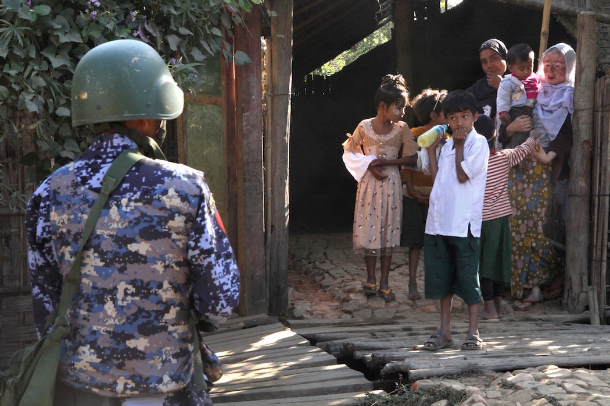UN resolution slams Myanmar over rights violations
Of the 47 UNHRC member nations, China, Cuba and the Philippines voted against the resolution

A Myanmar border guard policeman stands near a Rohingya Muslim family in a village during a government-organized visit for journalists in Buthidaung township in restive Rakhine State on Jan. 25. (Photo by Richard Sargent/AFP)
The United Nations Human Rights Council has expressed grave concern over continuing reports of serious human rights violations and abuses including sexual and gender-based violence in Myanmar.
In a resolution adopted March 22, the council called upon Myanmar authorities, in particular the country’s military and security forces, “to end immediately violence and all violations of international law” in Myanmar, particularly in Rakhine, Kachin and Shan states.
Thirty seven of 47 member nations of the UNHRC voted in favor of the resolution while China, Cuba and the Philippines voted against and seven abstained.
The resolution also expressed serious concern about the recent escalation of violence in Rakhine between Myanmar’s military and the Arakan Army insurgent group.
It called on the government to ensure “the protection of the human rights of all persons” and to take all measures necessary “to ensure accountability and to end impunity for all violations and abuses of human rights.”
Kyaw Moe Tun, permanent Myanmar representative to the U.N., rejected the resolution that was introduced by Romania on behalf of the EU. He said it was based on highly politicized and seriously flawed reports from a U.N. fact-finding mission and Yanghee Lee, the U.N.’s special rapporteur on Myanmar.
He said the adoption of another ill-intentioned, selectively targeted and politically motivated resolution will not help Myanmar.
“If there is genuine will, there is room for the EU and other co-sponsors to play a more constructive role in assisting Myanmar’s democratic transition,” said Kyaw Moe Tun.
Year extension for UN rights envoy
The council also decided to extend the mandate of the special rapporteur on the situation of human rights in Myanmar for another year.
It called upon Myanmar to resume cooperation with the special rapporteur to exercise of the role’s mandate, including by facilitating further visits and granting unrestricted access throughout the country.
The Myanmar government asked the Human Rights Council on March 11 to replace Yanghee Lee because it claimed she is biased.
Myanmar has barred Lee — who is outspoken about the human rights situation in the country — since December 2017.
The special rapporteur’s mandate requires two visits to Myanmar a year to report to the Human Rights Council and the U.N. General Assembly. Since taking up the role in June 2014, she has visited Myanmar six times.
Lee, who presented her most recent report to the council on March 11, has highlighted abuses linked to the exodus of more than 700,000 Rohingya Muslims from Rakhine since August 2017 following a Myanmar military crackdown.








